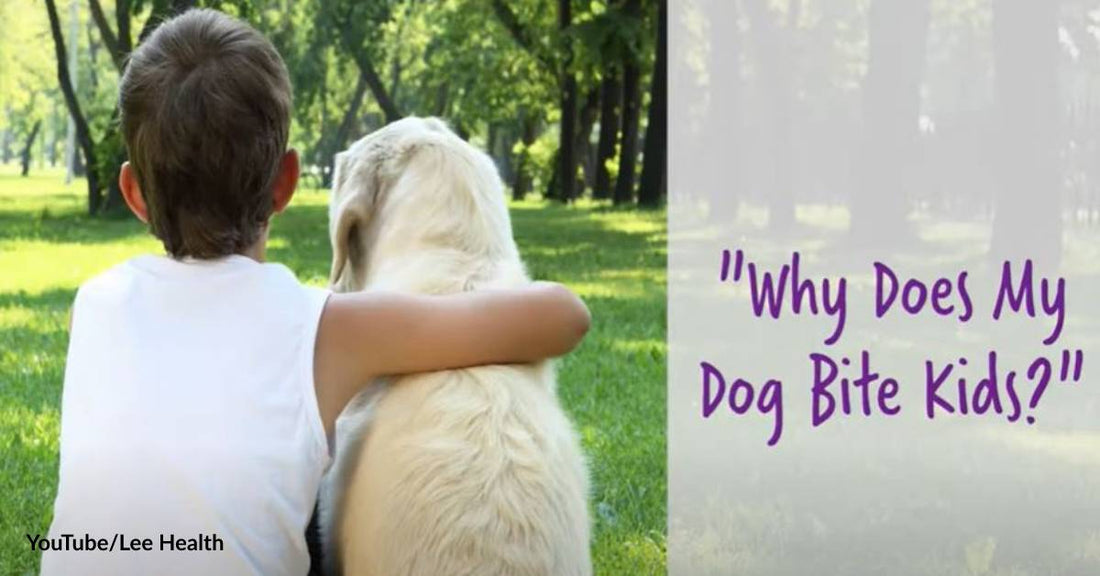Why Do Dogs Sometimes Bite Small Children?
Doris de Luna
"Dog bites pose a serious health risk to our communities and society. More than 4.5 million people are bitten by dogs each year in the United States, and more than 800,000 receive medical attention for dog bites, according to the U.S. Centers for Disease Control (CDC). At least half of those bitten are children," according to the website of the American Veterinary Medical Association.
PetHelpful also shared that 70% of those dogs who have been involved in biting children are family-owned. Further, this kind of incident is most likely to happen during summertime, on weekends, and between 4 pm and 8 pm, when parents are usually busy with dinner preparation and other household tasks.
 Photo: YouTube/Lee Health
Photo: YouTube/Lee HealthHowever, it is likewise important to note that a dog who has bitten a person is not necessarily aggressive. According to the position statements of the American College of Veterinary Behaviorists, "A dog’s aggression toward a person is unlikely to be motivated by an attempt to establish dominance. Other causes, such as fear and conflict, are far more likely."
So, what are the possible reasons why a dog may bite a child?
- A dog gets approached by a child while it is protecting its possessions, such as food bowl, bones, toys, sleeping space, or even people. This is especially risky for a child whom the dog does not trust.
- A dog feels cornered. Biting is part of a dog's defense mechanism, which a child can trigger by cornering it against a wall or underneath furniture. A child tends to reach out to a cornered dog, whose flight-or-fight response gets activated in uncomfortable situations.
- A child stares directly into a dog's eyes, which to this animal is a sign of intimidation or a threat. Unless a dog has been trained to enjoy eye contact, a dog may react to a child's staring with a bite.
- A child hugs or kisses a dog. A child's tendency is to hold a dog rather tightly, making the dog feel uncomfortable and trapped.
- A dog gets treated like a stuffed toy. A child may grab by its tail or pull its fur. A child may even poke a dog with his finger or one of his toys. A dog actually feels stressed around young kids whose behaviors are unpredictable. Some dogs may be patient, but others can reach their breaking point if they feel overwhelmed.
- A dog displays the signs of getting stressed or overwhelmed, but a child or even a parent may not recognize these early warnings.
- You have punished your dog for growling before. The consequence of punishing a dog for growling is that it may develop a tendency to bite without warning. As a parent, you must learn how to prevent dog bites and teach your kids as well.
- A dog is sleeping and a child suddenly wakes it up.
- A dog has undergone a stressful event, like moving into a new home and is unable to return to its routine. A stressed dog has a stronger tendency to bite; hence, you need to help it with calming aids and other loving ways.
- Redirected bite when it gets distrubed. This happens when a dog is in a state of fury and a child -- or any other person -- suddenly intervenes. There are safe ways for adults to stop a dog fight, such as the wheelbarrow technique.
- Dog's herding behavior. According to veterinary behaviorist Dr. Lisa Radosta, "Of course, chasing and biting children might be related to herding behavior in breeds like Welsh Corgis and Aussies, but these dogs should not be exhibiting fearful behavior such as growling, avoidance or raised hackles." That's why it's imprtant to be able to distinguish herding and fearful behaviors in order to avoid dog bites.
- Dogs, especially puppies, tend to play rough. Play-biting in dogs presents with the following signs: relaxed body language, play bows, barking in high pitch, and bites that don't cause harm. But if a dog exhibits the opposite of these, its tendency is to bite aggressively.
- A child teases a dog to the point of challenging it to bite.
- A dog is sick or in pain, resulting in behavioral changes.
- A dog is suffering a medical disorder which lowers its threshold for biting. Moreover, some medications like steroids may indirectly change its behavior by raising its cortisol (stress hormone) level.
 Photo: YouTube/Lee Health
Photo: YouTube/Lee Health Photo: YouTube/Lee Health
Photo: YouTube/Lee Health Photo: YouTube/Lee Health
Photo: YouTube/Lee Health Photo: YouTube/Lee Health
Photo: YouTube/Lee Healthhttps://www.youtube.com/watch?v=bXisBVlwc3E


